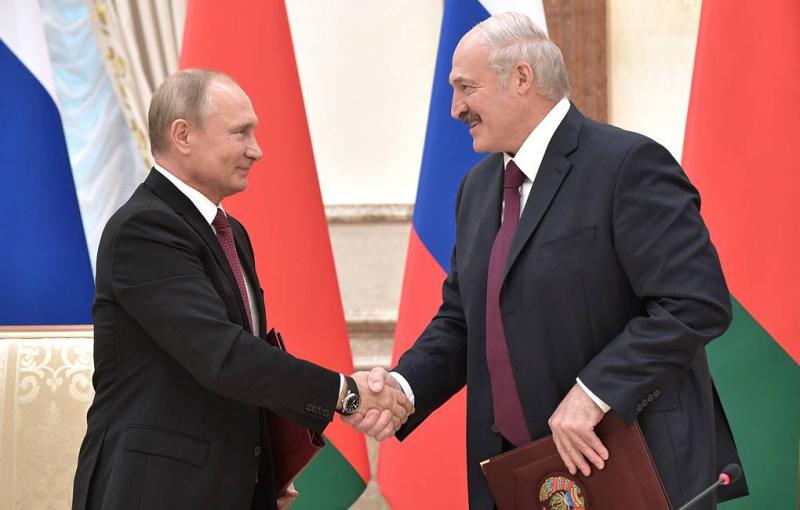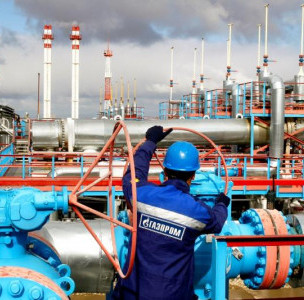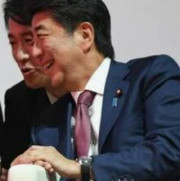
© Alexei Nikolsky/Russian Presidential Press and Information Office/TASS
Top stories from the Russian press on Monday, December 19th, prepared by TASS
Vladimir Putin intends to visit Belarus for the first time in three years to meet with his counterpart Alexander Lukashenko, Russian LNG export volumes to Europe surpass those to Asia, while Russia sets out to create high-profile video games. These stories topped Monday’s newspaper headlines across Russia.
Vedomosti: Putin to make his first trip to Belarus in three years
On December 19, Russian President Vladimir Putin will pay his first visit to Minsk since 2019, where he will meet with Belarusian President Alexander Lukashenko. The meeting’s agenda will include "the entire spectrum of bilateral ties, trade and economic cooperation, part integration concerns," Kremlin Spokesman Dmitry Peskov said. According to experts interviewed by Vedomosti, this meeting with Alexander Lukashenko will highlight Minsk and Moscow's unique ties.
The symbolic and political significance of Putin's first trip to Belarus in three years cannot be overstated. This will be a rare type of visit when the Russian president comes to friends and obvious allies, Head of the Center for Belarusian Studies at the Institute of Europe of the Russian Academy of Sciences Nikolay Mezhevich believes.
The fact that the meeting is set to take place on Belarusian soil after a series of visits by Lukashenko to Moscow, Sochi and St. Petersburg is vital, so that Minsk does not get the impression that it is just a "junior partner" seeking new preferences from Russia, according to researcher at IMEMO Dmitry Ofitserov-Belsky.
Meanwhile, Mezhevich believes that Putin's visit points to the special relationship between Minsk and Moscow. So, within its framework, the discussion will not only focus on the integration schedule of the gas sector, which Lukashenko complained about and demanded that the responsible parties be found, but also on agrarian, industrial, energy issues, along with other economic integration matters, as well as exchange rates. The fact that Lukashenko expressly cited the inability to develop a single gas market indicates his concern about the goal of equalizing fuel prices in the two countries, the expert said.
Security issues will be tackled in Minsk, but they are not a priority, according to Ofitserov-Belsky. Foreign policy issues will be discussed, specifically Minsk's membership in international organizations, particularly the CIS, the CSTO, and the EAEU, as well as the possibilities for its membership in the SCO.
Vedomosti: Europe surpasses Asia in terms of Russian LNG imports
Russia boosted its overall liquefied gas exports by 9% year on year to 40 bln cubic meters (bcm) between January and November 2022, Vedomosti wrote citing a report by the consulting firm B1 (previously EY in Russia). Meanwhile, gas shipments to Europe from Russia since the beginning of the year have already outpaced supplies to Asia.
According to B1, exports to Europe (including the United Kingdom and Turkey) rose 22% in 11 months to 20 bcm. Deliveries to Belgium climbed 110% to around 5 bcm, supplies to France soared by over 50% to 7.3 bcm, and to Spain - by more than 40% to 4.5 bcm.
Out of all the Asia-Pacific countries, China boosted its LNG imports from Russia by almost 30% to 6.5 bcm in the 11-month period, while Japan increased its imports by 1% to 8.4 bcm. Supplies to China rose amid a 20% overall decline in LNG imports to this country, to roughly 77 bcm. Head of the B1 Moscow Energy Center Olga Beloglazova noted that total imports to China are dropping as a result of the economic slowdown, quarantine measures, and sensitivity to high prices.
Alfa-Bank Senior Analyst Nikita Blokhin believes the increase in Russian LNG exports to the EU is due to a decline in demand for pipeline gas and its substitution with liquefied gas, as planned by the pan-European energy strategy. "Because Russian LNG is not subject to the sanctions limitations, it continues to access the premium European market on an equal playing field with other market competitors," the expert noted.
Blokhin attributes the prospective rise of Russian LNG exports to the speed with which Novatek's new projects - transshipment complexes in Murmansk and Kamchatka, as well as the Arctic LNG-2 facility - are being implemented.
Nezavisimaya Gazeta: Tajikistan paves economic path to Pakistani seaports
Dushanbe and Islamabad have a common position on resolving the situation in Afghanistan. The two countries are eager to deepen their cooperation in the energy and transportation sectors, including Tajikistan's access to Pakistani ports in Karachi and Gwadar, Tajik President Emomali Rahmon said following his talks with Pakistani Prime Minister Shahbaz Sharif. In any case, for Tajikistan, this is a shorter and more convenient route to international markets than the northern route through Uzbekistan, Kazakhstan, and Russia, Nezavisimaya Gazeta writes.
Emomali Rahmon’s current visit to Islamabad on December 14-15 was a continuation of the negotiations that began in Pakistan in June last year on the development of energy cooperation under the CASA-1000 project, as well as the formation of transit and transportation corridors from Tajikistan to the Pakistani ports of Karachi and Gwadar.
That said, the leader of Tajikistan offered additional priority areas for cultivating this bilateral partnership, and they include consumer goods in the food sector, agriculture, the production of construction supplies and pharmaceuticals. "It is no coincidence that electronic data interchange of customs services, standardization, and transit trade became important topics of discussion between President Rahmon and Pakistani Prime Minister Sharif," Research Fellow at The Institute of Oriental Studies at the Russian Academy of Sciences Alexander Vorobyov told the newspaper. According to the expert, their goal is to expand commerce from $55 mln to $500 mln.
The topic of Afghanistan was also discussed throughout the negotiations, since the transportation and energy routes from Tajikistan to Pakistan run through this country. The shortest path from Tajikistan to the sea is through Afghanistan to Pakistan.
According to Vorobyov, President Rahmon's visit to Pakistan was motivated by a desire to strengthen relations with the state, which now plays a pretty substantial political and economic role in the life of the region close to Tajikistan.
Izvestia: Russia may legalize cryptocurrency mining
The State Duma may pass a draft law on cryptocurrency mining regulation in the first reading this week, including licensing, revenue declaration, and payment of taxes, Chairman of the State Duma Committee on Financial Markets Anatoly Aksakov told Izvestia. The Bank of Russia announced its conceptual support for the program. However, experts believe that it will be difficult to rapidly settle the issue, which has been in the gray zone for a long time.
"Our committee has already reviewed the bill. Although not all the coordinating bodies have provided official responses. But we hope to adopt it in the first reading this week, and we will finalize it for the second and third readings in January," Aksakov said. He emphasized that mining has long operated as a business in Russia, but it is not regulated in any way.
"The Bank of Russia supports the bill conceptually. It imposes limits on transactions involving cryptocurrency obtained through mining. At the same time, cryptocurrency acquired through mining can only be sold using foreign information infrastructure and to non-residents," the press service of the regulator said.
"The subject is new. So, it will be trial and error. It is unlikely that it will be successful the first time," Associate Professor of the Department of Stock Markets and Financial Engineering of the Faculty of Finance and Banking at RANEPA Sergey Khestanov told the newspaper.
However, he believes that if the authorities work hard enough, huge changes will be possible soon. The expert noted that large-scale mining is impossible to conceal due to significant energy usage.
Kommersant: Russia may spend around $50 bln on game development
The government is exploring serious measures to assist the Russian video game industry until 2030, Kommersant writes. Lawmakers are talking about setting up a state-controlled game developer and publisher, which will require up to $50 bln in the most ambitious scenario, as well as a domestic rating agency, and a 14-fold growth in the number of studios. By 2030, 25 video games with budgets of 6.5 bln rubles (around $100 mln) per game are planned, as well as 40 less expensive ones, in order to compete with popular global projects and become a "soft power tool". However, experts argue that achieving the goals will be very difficult due to the exodus of a multitude of IT specialists from Russia.
The office of Deputy Prime Minister Dmitry Chernyshenko told Kommersant the Ministry of Digital Development was instructed to "work on these issues until February 20." The ministry confirmed "it is possible both to establish support for the gaming industry into a separate federal project or to include it in existing projects and other formats." They clarified that the formats, options and sources of funding are being hammered out, and extra-budgetary mechanisms are most likely to be proposed. "The gaming industry has great investment potential," the ministry said.
Alexey Koptsev, CEO and founder of the Cyberia Nova, told Kommersant that there are currently just ten game studios in Russia capable of releasing AAA projects. "One could argue that the market has been reset to zero. The majority of the studios have relocated to other countries to continue their work, and new ones are still being set up," he said.
The Russian video game industry in its current state will not be able to fulfill these goals, the founder of rawg.io Gadzhi Makhtiev agrees. He noted it would take 2-3 years to create new teams, and they would be ready to show high-quality products only in 2024-2025. The development cycle of ambitious projects, the expert emphasized, is rarely less than three years.









